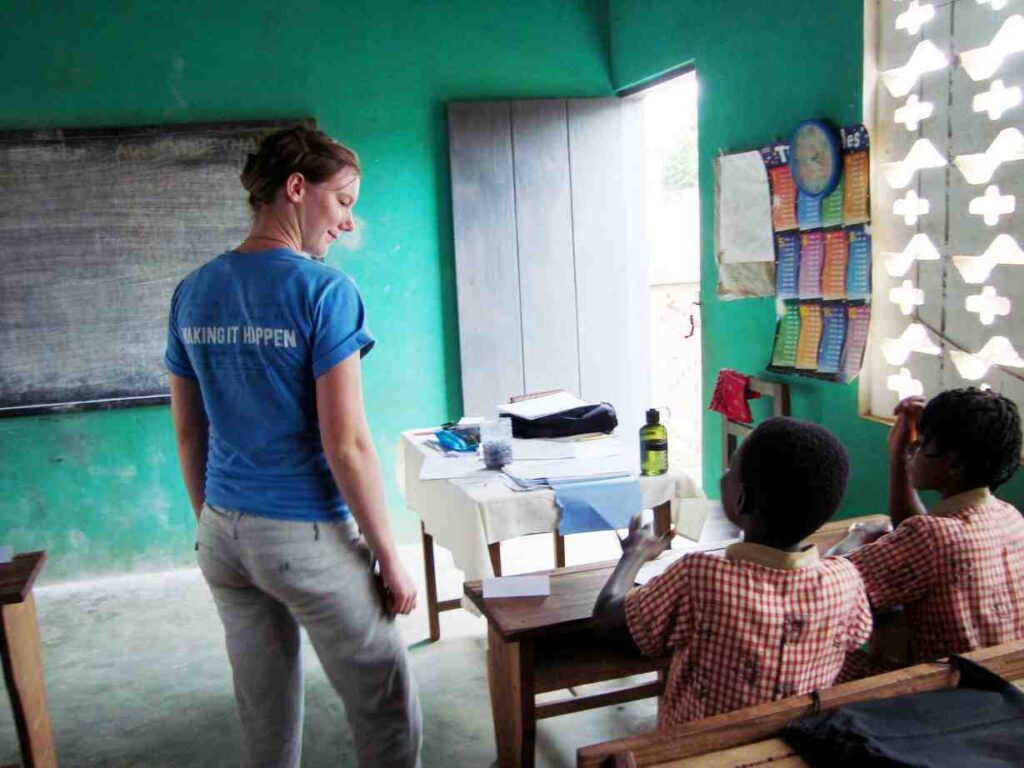- Start by making a list of everyone you know.
Don’t exclude anyone. You never know who might be willing to help you achieve your goal. The more contributions, the better, so consider expanding beyond your inner circle of close friends and immediate family members. The cardinal rule of fundraising is if you don’t ask, you won’t get anything. Whom do you know? Ask anyone and everyone you know, and even those you don’t know, to contribute to your cause. - Write out your goals and reasons for volunteering.
When writing your fundraising letter, explain how a donation will make an impact. - Keep it short and simple.
Keep your letters to one page. Too much information can alienate a potential donor. Many of your donors will not be familiar with the intricacies of international volunteering or international development; they will be more interested in contributing to a good cause (education, the medical field, caring for children or the elderly, training adults in specific skills. - Identify your support system.
Some people will be extremely supportive and share your enthusiasm and excitement. Talking to people and listening to their reactions will help you gauge the level of interest and support they will provide - Ask for a specific amount of money.
When you say “contribution”, some people are thinking $10, while others are thinking $500. Tell people how much you need. Let them know the total amount that you are hoping to fundraise. You may even want to outline the cost per day of your program (divide your total program fee by the number of days you will be overseas). Established, professional people often can contribute more money than those who are students. Don’t be afraid to ask your more established contacts for $100, $200 or even $500. - Convey a sense of urgency.
This limits their time to forget about giving you a contribution. - Make it convenient for them to donate toward your program, and get a commitment for a contribution rather than a promise. Say, “If you are unable to contribute immediately, why don’t you post-date a check?”
- Give incentives. Many people who make donations simply want recognition and praise. Write a thank you letter and include a printed list of your supporters’ names. Host a small open house before you depart to publicly acknowledge and thank your supporters.
- Promise a presentation upon your return. Offering to give a slide show upon your return is a great way to secure funding from religious organizations, civic groups, alumni associations, and educational institutions. Tangible evidence of your actions abroad helps people understand where their contributions have gone. Photos and/or movies of you working overseas can be good reminder of how their donations made an impact.
- Always follow up. It is important to get on the phone with a small business, a civic or religious group, and your friends and relatives to let them know that you really do need their support. One follow-up call can make the difference between their sending a check or pushing the request to the back burner and never getting to it.
SOME FUNDRAISING ACTIVITIES
- LETTER-WRITING: A letter-writing or flyer campaign is one of the simplest and most effective fundraising methods you can use. Send letters to friends and family, employers and co-workers, clubs, churches or temples, local banks, foundations and charitable organizations in your area. You also may want to engage in an e-mail campaign to friends and family.
- UNIVERSITY FUNDS: If you are a student, one major source of funding is your own college or university. Many school clubs are allocated a certain amount of funds through student activities. See if your club is eligible. Many departments also have discretionary funds for projects and programs. If your volunteer program can be integrated into an academic or service-learning course, there may also be some funds that could be used for your program.
- GRANTS: One of the most common ways to raise money is through grant proposals. Though a grant proposal is very simple to write, getting it accepted is difficult. The Ford Foundation receives more than 1,000 proposals daily requesting money! Also, grants are often time-sensitive in that foundations have deadlines and funding cycles. One of the most comprehensive books on foundations is the Foundation Directory, which is available at most libraries. It lists the board members of most foundations and the types of projects they fund. Follow the “Who Do You Know” principle and see if someone you know is on the board of a foundation that might give to your cause
- LOCAL BUSINESSES: Local businesses are far more likely than large corporations to make a contribution to your cause. The key is to make a link between the owner and you or someone close to you. You may want to approach the business with a letter first, enclosing all relevant materials and a pledge form, and then follow up with a phone call. We know of one volunteer whose program was funded through a grocery store. In turn, the store was pleased to have the publicity.
- SERVICE CLUBS/PLACES OF WORSHIP: Service clubs such as Rotary, Kiwanis, Lions, and Optimists, fraternal organizations such as Elk and Moose clubs, and religious groups such as churches and temples are excellent sources for fundraising. Follow the “Who Do You Know” principle; is someone you know a member or a friend of a member? The best course of action is to contact as many clubs in your area as possible and to ask if you can give a presentation to their club. Many clubs have breakfast, lunch or dinner meetings where you can ask to speak for 10–20 minutes to present your request and explain what you will be doing. This is your chance to thoroughly explain your volunteer program. Remember, you are not asking for money for a vacation, rather you are asking for a donation to do volunteer work overseas and to make a difference in the world. Also, let them know that you are willing to come back and show them slides or a video of the program when you return. After the meeting, write a follow-up letter thanking them for letting you speak and reiterating your request for contributions. Be realistic about the amount you are requesting and how it will be used
- EVENTS: Events are fantastic ways to fund-raise that can involve your community, raise awareness of international issues, allow you to be creative, give donors something in return and generate a lot of interest in your campaign. When reading through the events options below, keep in mind your skills and interests and your contacts. These will be crucial. Sales – One of the traditional ways to raise funds is through bake sales, arts and crafts sales, candy sales, garage sales, etc. Do you know someone who is a great baker, an artist, or a published writer? Ask them if they might donate their creations to you so that you may allocate the sale, or suggested donation, towards your program. Raffles – This works better for groups raising funds. Often groups can get items donated to them from local stores, companies, and restaurants, which they can raffle off, usually at a larger event such as a dance. Use the “Who Do You Know” principle. If there are no large items to raffle off, sometimes groups buy something like a television. This can work well as long as the proceeds are well over the price of the item purchased. Parties, Dances, Music – These can range from black tie affairs to simple pizza parties. Again, use the “Who Do You Know” principle. Do you have a friend in a band? Do you know the owner of a bar or a restaurant? Some simple events include having a band play at a club where you get the cover charge or a percentage of the drink sales. Or perhaps a restaurant will allow you an evening offering an all-you-can eat buffet for $20 where you get $10 and the restaurant gets $10. You can even throw your own party and ask your guests to pay a cover charge, provided the cover is well over the cost of the party. These types of events can be very labor intensive. Be careful how you structure them and be clear about your expectations.
- MEDIA: Perhaps one of the best ways to promote awareness and to raise funds for your upcoming international adventure is through the local media (radio, printed press and television). You can circulate the enclosed press announcement to publications with which you may be affiliated, such as your hometown newspaper, the paper from the town where you presently reside, alumni magazines, church bulletins, etc. Having a short piece published anywhere can go a long way in your quest for funds.
Credit: Cross Cultural Solutions



